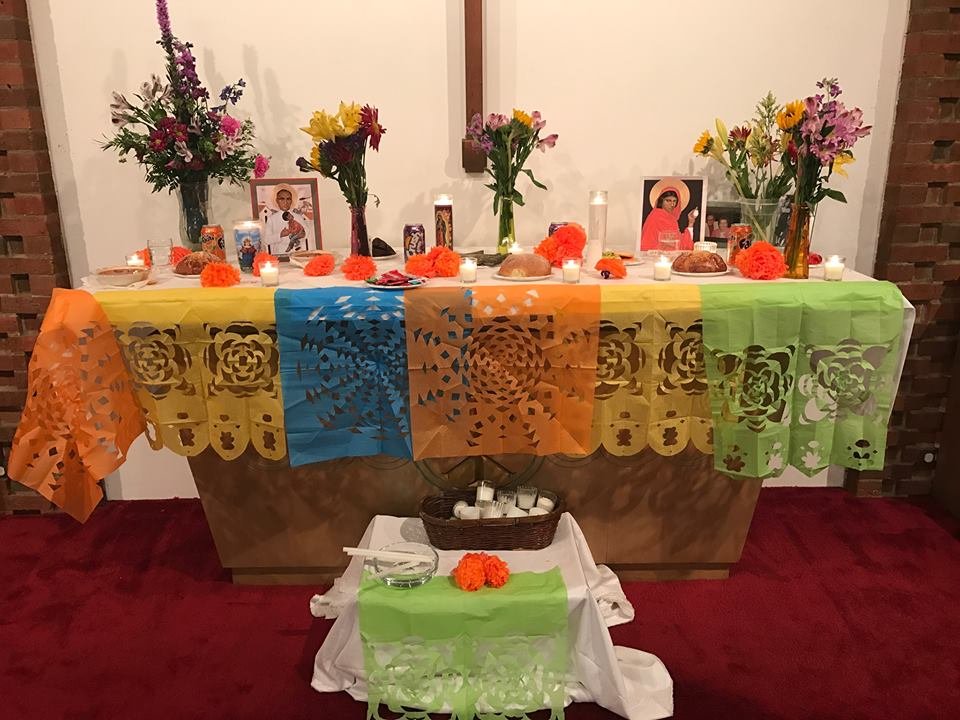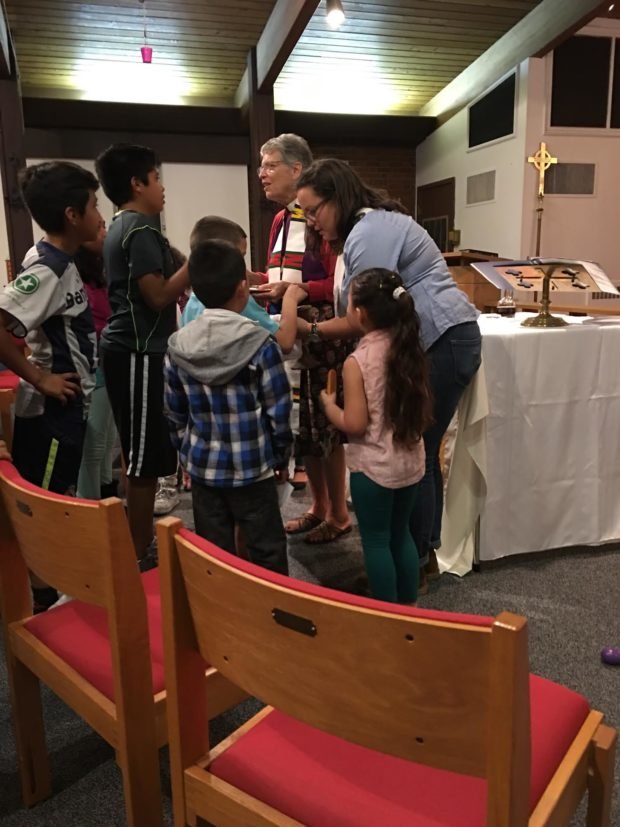Life and Death
I have been sitting with death these past few weeks. My uncle died two weeks ago, our family gathered around his bedside and said prayers and told stories and wept. We honored him and said goodbye and had a service and a celebration. And yet, grief is a strange creature. It seems to wind its way into your heart and take up residence, and then it overflows in the most unlikely moments. I have found myself weeping in the shower and oversharing in front of colleagues – I’m noticing how my own family story plays out in other relationships at work and at home, and the things I’m mourning are more than one person but layers and layers of unexpressed emotions and frustrations with myself, my family, the church, and our society at large.
A week after my uncle died, I attended a Dia de los Muertos service at the Latino Ministry Center in Forest Park. Dia de los Muertos, or the Day of the Dead is a time of joy to celebrate the lives of our loved ones who are no longer here with us but to remember them as part of that ‘great cloud of witnesses’ who surround us in prayer and community throughout time. I loved the opportunity to gather with more than 75 people and to pray in Spanish prayers of remembrance. My friend, Maggie, asked us to share stories of loved ones and a few people did, but mostly there was an awkward silence – one woman just shook her head and said “I can’t, it’s too sad.” I found beauty and holiness there that night. Praying those prayers in Spanish, trying to sing and respond in a foreign language reminded me that grief is a foreign language. It feels awkward and vulnerable and hard. You feel like you are saying and doing everything wrong. And yet, it’s all we have – we show up and speak words that can’t be fully formed because we don’t know the words, we laugh awkwardly because we don’t know what to say, we sit in silence and hope that our presence and leaky eyes somehow give honor to what our jumbled words and emotions can’t adequately express.
Something else has happened during these weeks of grief, as I think through endings not just of physical life, but death in all forms – shifting collegial relationships, our dog is living out his final days, and this election season has for me been a reminder of the dying of systems of influence and power that all too often the church has been complicit in creating and re-creating instead of transcending. I have been wondering what we leave behind when things die. What is our inheritance – what seeds will fall to the earth, the hope of a future re-birth not yet seen? I have been afraid that our inheritance is fear and anxiety. That we care more about preserving ourselves, our money, and power, and egos than we do about our common humanity. What if we care more about self-preservation than about love poured out for others?
But I am realizing that it is all bound up together – this grief and fear and anxiety is mixed in with joy and hope and beauty. We are our best, when we stand together in our grief. In the moments after my uncle died, my dad and aunt and cousins and my cousin’s three year old son were sitting in my uncle’s hospital room. My uncle had always loved tennis, so they had put tennis balls under his hands as he lay dying. My aunt handed her grandson, one of the balls and asked if he would like to have it. He nodded and with a big smile stretching over his face – he took the ball and raised it over his head and sent it bouncing across the slick floors of the hospital room and his laughter rang out – we couldn’t help ourselves, we laughed with him and began bouncing balls back and forth over and under my uncle’s body – life lived in the midst of death. Our tears and laughter, life and death these things cannot be unwound or compartmentalized.
At Dia de los Muertos, the very best part for me, was the abundance of children, coloring, playing, talking, singing, praying, and making lots of noise. As a mother and a priest, it was so refreshing to see children welcomed with their exuberance and life into the midst of a service remembering and honoring those who have died. I think we want to protect young children (and maybe more ourselves) from realizing just how thin the veil is between life and death, that we are one body, one church, and that the saints here on earth and the saints at rest are united together both now and in the time to come.
Part of the Eucharistic Prayer that night was translated, “In the fullness of time, you sent your own Son, who emigrated from heaven to earth, and he who was in communion with you made himself one with us.” We are one. With God, with one another, with the living, and the dead. We are one. Which means if we are to live together, we have to be willing to die together.
On this morning after the election, when so many are feeling all is lost, my dear friend, Karl Stevens, gave me hope in posting this: “Giving up power is what Christians are called to do. There is no resurrection without death…it feels like something is dying. I can only hope and pray that this feeling of death will bear fruit, that there will be a resurrection which will, like all resurrections, be utterly surprising.”
May we learn to live with such hope, and may we let each other and the things of this world die with grace. And may we search out the seeds of joy that will bear fruit now and in the time to come! May it be so.
Written by Jane Gerdsen, November 9, 2016.

